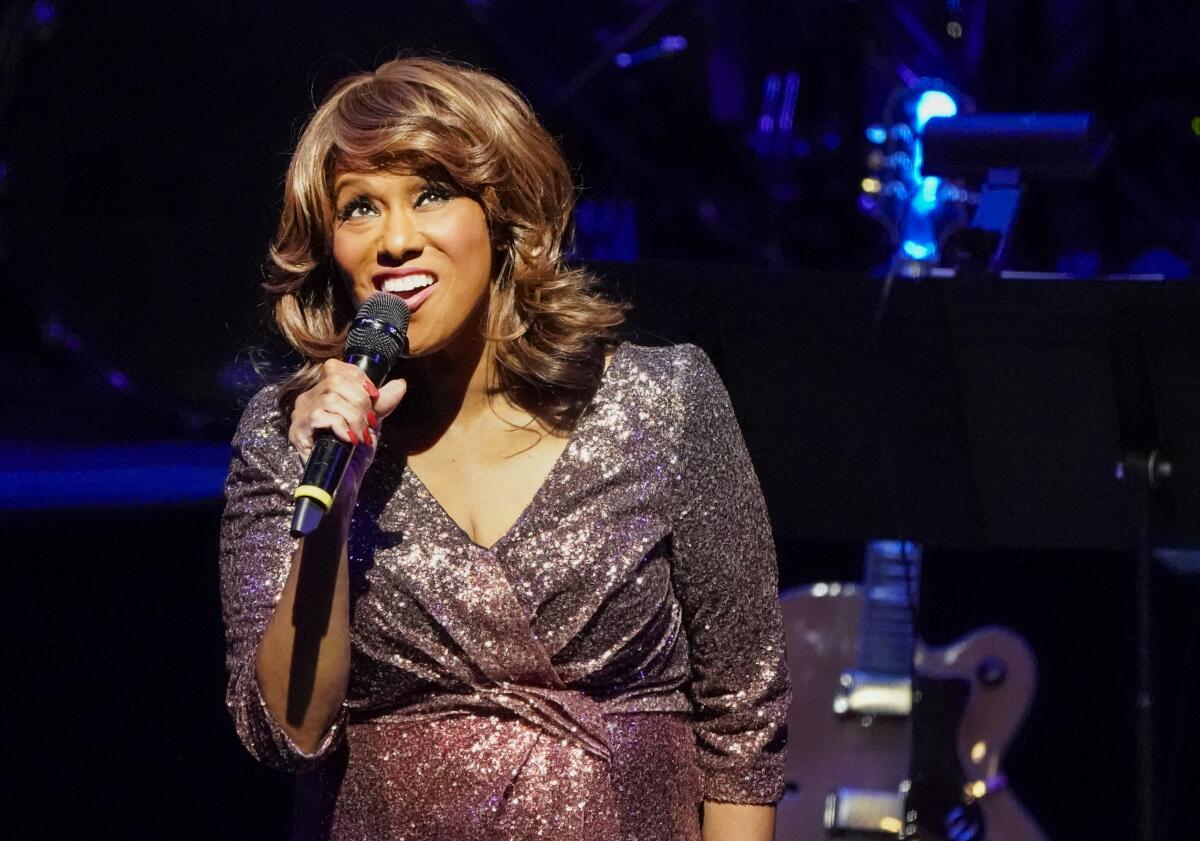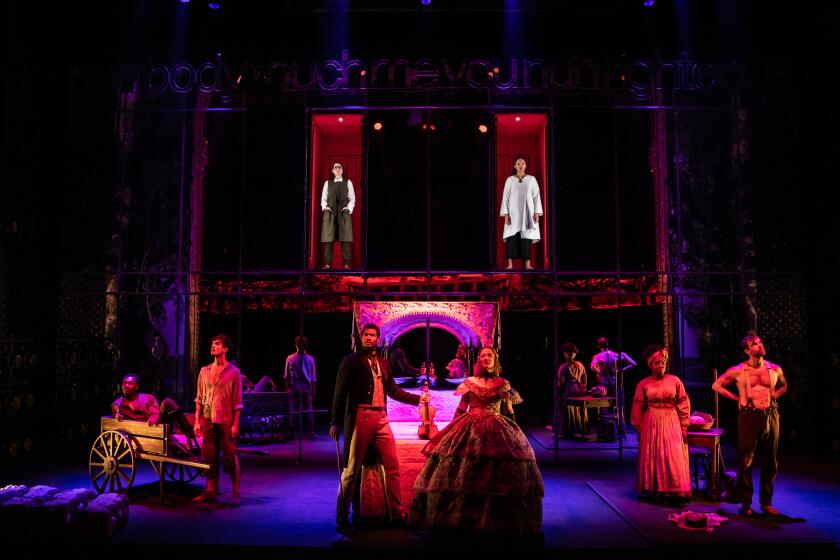Review: Jennifer Holliday, vulnerable and resplendent, shines at the Wallis

- Share via
When Jennifer Holliday performed her signature song, “And I Am Telling You I’m Not Going,” at the Tony Awards last month, those in the audience at Winter Garden Theatre as well as those watching on Paramount+ were given a thunderous refresher on the meaning of “showstopper.”
Holliday set off an earthquake on Broadway in 1981 when she introduced the number near the end of the first act of the musical “Dreamgirls.” New York Times theater critic Frank Rich wrote that “if the curtain didn’t fall, the audience would probably cheer Jennifer Holliday until dawn.”
At the Wallis Annenberg Center for the Performing Arts on Saturday, an older, glamorous and more ruminative Holliday threw herself once again into what she self-deprecatingly referred to as her “one hit.” When she sang the anthem on Broadway in her early 20s, she said she was mystified by the “begging and pleading.”
With two marriages behind her, she said she finally understands the song. But rather than playing up the emotional desperation, she seemed to be singing to part of herself — the resilient Holliday reassuring the achingly vulnerable Holliday that she wasn’t going anywhere.
On the verge of 61, in what she called her “third act,” she’s philosophical about her career, which she said has had more downs than ups. The ups, which include a Tony for her performance as Effie Melody White in “Dreamgirls” and two Grammys, have been glorious by any standard.
But the lows have been long and lonely. Watching the film “Judy” during the pandemic, she said, she could identify with Renée Zellweger’s portrayal of Judy Garland, even though drinking and drugs have not been her problem. The desolation left by fame’s fickleness struck a deep chord.
“And I Am Telling You,” requested whenever she’s on the bill, has become her version of “I’m Still Here.” Yes, she still touches down on rock bottom when she sings it. But it’s her faith in her capacity to rise that allows her to maturely soar.
Holliday has been open about her health ordeals, including multiple sclerosis, clinical depression and the weight loss surgery that transformed her appearance. Gratitude for being a survivor has eclipsed the fear of being left behind.
Jeremy O. Harris threatens to pull ‘Slave Play’ from the Mark Taper Forum in solidarity with female playwrights noting the lack of representation.
The story behind the music — like everything with a diva who has been bravely, if at times impolitically, open about her professional and personal struggles — is complicated.
Having shot to fame in her early 20s as a Broadway supernova, Holliday found success as an R&B and gospel singer. But as the music industry in the 1980s became more preoccupied with video appeal than with singing talent, Holliday was given the shaft, much like overweight Effie in “Dreamgirls.”
Broadway, not exactly showering her with opportunities even after she demonstrated what she could do, was hardly a safe haven. And having flirted with the limelight as a recording artist, it’s not clear that the less lucrative grind of eight shows a week was still her dream — though ultimately it’s Broadway’s loss that Holliday has made only sporadic returns as a glittering replacement in long-running musicals.
Holliday was apologetic about her performance at the Wallis’ Bram Goldsmith Theater. She flubbed a few lyrics and was out of sync with a group of local musicians she was performing with for the first time. But there was no need for contrition. The audience kept erupting into spontaneous standing ovations.
The concert, aptly titled “Here’s To Life,” was intimate and electrifying. Holliday can still sing. The power of her voice is accessible at will, though she doesn’t just blow like she used to. Technique guides and protects her volume dial. But it’s the dusky shadings and subtle Southern lilts that imbue emotional color and make other people’s songs momentarily her own.
The arrangements weren’t all fully worked out. Holliday joked to the masked audience that we’re all, herself included, getting back up to speed with live performance. She delivered “The Way He Makes Me Feel” in tribute to Barbra Streisand, whom she was told by “Dreamgirls” director Michael Bennett to study. She thanked audience members for their patience after offering her version of “Skylark,” but the fusion of story and song that Bennett tried to convey by way of Streisand stuck.
The evening kicked into high gear when Holliday entered “Dreamgirls” territory. A slow, sad, burning rendition of “One Night Only” led the way to “I Am Changing,” which was prefaced by a long confession. Showing up for her life, she said, has taken work. She’s still trying to grow, still trying to be present. The song has been a kind of mantra for her. When she sang Effie’s second-act number, she brought every ounce of this history to bear. The fervor of her performance was an act of redemption. The audience rose up like a flame, fire meeting fire, when she was through.
She seemed to be having issues with the tempo of “God Bless the Child,” but she slowed the orchestra, led by musical director Herman Jackson, and fell into an improvisatory rhythm that was one of the evening’s high points. The intersection of jazz, blues, gospel and soul is where Holliday is most distinctly herself — most free and most joyful. A program that was perhaps more concentrated in this mode would be the most sought-after cabaret in America.
She paid homage to her late friend Marvin Hamlisch, who threw her a lifeline of orchestra singing when she was facing oblivion, by singing his classic “The Way We Were.” To perform two Streisand songs in the same evening takes guts, but Holliday pulled it off by modestly taking them into idiosyncratic corners.
Of course she brought the house down when she closed the show with “And I Am Telling You.” An encore of “At Last” was hardly necessary and almost too much. Holliday’s generosity was intermixed with insecurity. She felt bad that the evening wasn’t perfectly executed, even as the audience was hoarse with exultation.
Holliday, still a work in progress, deserves to settle into her brilliance. Seeing her perform again, I was reminded that it’s not an artist’s proximity to perfection that moves us. It’s the confrontation with a singular power. On Saturday in Beverly Hills, Holliday graced her audience with a gift that could never adequately be repaid.
More to Read
The biggest entertainment stories
Get our big stories about Hollywood, film, television, music, arts, culture and more right in your inbox as soon as they publish.
You may occasionally receive promotional content from the Los Angeles Times.












